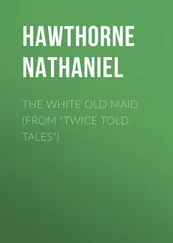This one mystic branch hung down before the main entrance of the Seven Gables, so nigh the ground that any passer-by might have stood on tiptoe and plucked it off. Presented at the door, it would have been a symbol of his right to enter, and be made acquainted with all the secrets of the house. So little faith is due to external appearance, that there was really an inviting aspect over the venerable edifice, conveying an idea that its history must be a decorous and happy one, and such as would be delightful for a fireside tale. Its windows gleamed cheerfully in the slanting sunlight. The lines and tufts of green moss, here and there, seemed pledges of familiarity and sisterhood with Nature; as if this human dwelling-place, being of such old date, had established its prescriptive title among primeval oaks and whatever other objects, by virtue of their long continuance, have acquired a gracious right to be. A person of imaginative temperament, while passing by the house, would turn, once and again, and peruse it well: its many peaks, consenting together in the clustered chimney; the deep projection over its basement-story; the arched window, imparting a look, if not of grandeur, yet of antique gentility, to the broken portal over which it opened; the luxuriance of gigantic burdocks, near the threshold; he would note all these characteristics, and be conscious of something deeper than he saw. He would conceive the mansion to have been the residence of the stubborn old Puritan, Integrity, who, dying in some forgotten generation, had left a blessing in all its rooms and chambers, the efficacy of which was to be seen in the religion, honesty, moderate competence, or upright poverty and solid happiness, of his descendants, to this day.
One object, above all others, would take root in the imaginative observer’s memory. It was the great tuft of flowers, — weeds, you would have called them, only a week ago, — the tuft of crimson-spotted flowers, in the angle between the two front gables. The old people used to give them the name of Alice’s Posies, in remembrance of fair Alice Pyncheon, who was believed to have brought their seeds from Italy. They were flaunting in rich beauty and full bloom to-day, and seemed, as it were, a mystic expression that something within the house was consummated.
It was but little after sunrise, when Uncle Venner made his appearance, as aforesaid, impelling a wheelbarrow along the street. He was going his matutinal rounds to collect cabbage-leaves, turnip-tops, potato-skins, and the miscellaneous refuse of the dinner-pot, which the thrifty housewives of the neighborhood were accustomed to put aside, as fit only to feed a pig. Uncle Venner’s pig was fed entirely, and kept in prime order, on these eleemosynary contributions; insomuch that the patched philosopher used to promise that, before retiring to his farm, he would make a feast of the portly grunter, and invite all his neighbors to partake of the joints and spareribs which they had helped to fatten. Miss Hepzibah Pyncheon’s housekeeping had so greatly improved, since Clifford became a member of the family, that her share of the banquet would have been no lean one; and Uncle Venner, accordingly, was a good deal disappointed not to find the large earthen pan, full of fragmentary eatables, that ordinarily awaited his coming at the back doorstep of the Seven Gables.
“I never knew Miss Hepzibah so forgetful before,” said the patriarch to himself. “She must have had a dinner yesterday, — no question of that! She always has one, nowadays. So where’s the pot-liquor and potato-skins, I ask? Shall I knock, and see if she’s stirring yet? No, no, — ‘t won’t do! If little Phoebe was about the house, I should not mind knocking; but Miss Hepzibah, likely as not, would scowl down at me out of the window, and look cross, even if she felt pleasantly. So, I’ll come back at noon.”
With these reflections, the old man was shutting the gate of the little back-yard. Creaking on its hinges, however, like every other gate and door about the premises, the sound reached the ears of the occupant of the northern gable, one of the windows of which had a side-view towards the gate.
“Good-morning, Uncle Venner!” said the daguerreotypist, leaning out of the window. “Do you hear nobody stirring?”
“Not a soul,” said the man of patches. “But that’s no wonder. ‘Tis barely half an hour past sunrise, yet. But I’m really glad to see you, Mr. Holgrave! There’s a strange, lonesome look about this side of the house; so that my heart misgave me, somehow or other, and I felt as if there was nobody alive in it. The front of the house looks a good deal cheerier; and Alice’s Posies are blooming there beautifully; and if I were a young man, Mr. Holgrave, my sweetheart should have one of those flowers in her bosom, though I risked my neck climbing for it! Well, and did the wind keep you awake last night?”
“It did, indeed!” answered the artist, smiling. “If I were a believer in ghosts, — and I don’t quite know whether I am or not, — I should have concluded that all the old Pyncheons were running riot in the lower rooms, especially in Miss Hepzibah’s part of the house. But it is very quiet now.”
“Yes, Miss Hepzibah will be apt to over-sleep herself, after being disturbed, all night, with the racket,” said Uncle Venner. “But it would be odd, now, wouldn’t it, if the Judge had taken both his cousins into the country along with him? I saw him go into the shop yesterday.”
“At what hour?” inquired Holgrave.
“Oh, along in the forenoon,” said the old man. “Well, well! I must go my rounds, and so must my wheelbarrow. But I’ll be back here at dinner-time; for my pig likes a dinner as well as a breakfast. No meal-time, and no sort of victuals, ever seems to come amiss to my pig. Good morning to you! And, Mr. Holgrave, if I were a young man, like you, I’d get one of Alice’s Posies, and keep it in water till Phoebe comes back.”
“I have heard,” said the daguerreotypist, as he drew in his head, “that the water of Maule’s well suits those flowers best.”
Here the conversation ceased, and Uncle Venner went on his way. For half an hour longer, nothing disturbed the repose of the Seven Gables; nor was there any visitor, except a carrier-boy, who, as he passed the front doorstep, threw down one of his newspapers; for Hepzibah, of late, had regularly taken it in. After a while, there came a fat woman, making prodigious speed, and stumbling as she ran up the steps of the shop-door. Her face glowed with fire-heat, and, it being a pretty warm morning, she bubbled and hissed, as it were, as if all a-fry with chimney-warmth, and summer-warmth, and the warmth of her own corpulent velocity. She tried the shop-door; it was fast. She tried it again, with so angry a jar that the bell tinkled angrily back at her.
“The deuce take Old Maid Pyncheon!” muttered the irascible housewife. “Think of her pretending to set up a cent-shop, and then lying abed till noon! These are what she calls gentlefolk’s airs, I suppose! But I’ll either start her ladyship, or break the door down!”
She shook it accordingly, and the bell, having a spiteful little temper of its own, rang obstreperously, making its remonstrances heard, — not, indeed, by the ears for which they were intended, — but by a good lady on the opposite side of the street. She opened the window, and addressed the impatient applicant.
“You’ll find nobody there, Mrs. Gubbins.”
“But I must and will find somebody here!” cried Mrs. Gubbins, inflicting another outrage on the bell. “I want a half-pound of pork, to fry some first-rate flounders for Mr. Gubbins’s breakfast; and, lady or not, Old Maid Pyncheon shall get up and serve me with it!”
“But do hear reason, Mrs. Gubbins!” responded the lady opposite. “She, and her brother too, have both gone to their cousin’s, Judge Pyncheon’s at his country-seat. There’s not a soul in the house, but that young daguerreotype-man that sleeps in the north gable. I saw old Hepzibah and Clifford go away yesterday; and a queer couple of ducks they were, paddling through the mudpuddles! They’re gone, I’ll assure you.”
Читать дальше












